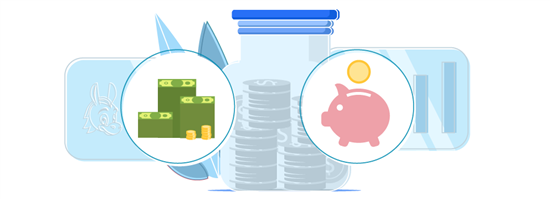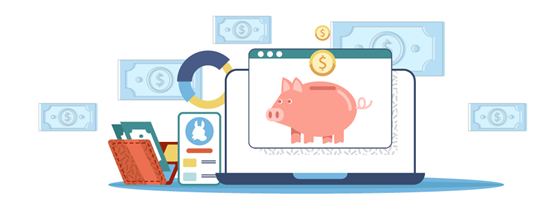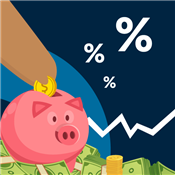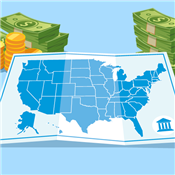Checking vs Savings Account
Ad Disclosure: This article contains references to products from our partners. We may receive compensation if you apply or shop through links in our content. This compensation may impact how and where products appear on this site. You help support CreditDonkey by using our links.
A checking account is for everyday use, while a savings account has less flexibility but higher interest. Get one or both, based on your needs.
 |
| © CreditDonkey |
Banks offer two basic deposit accounts: checking and savings.
Checking accounts are designed for everyday banking activities, such as making purchases and paying bills.
Savings accounts can grow your funds over time with the help of some interest.
Read on to learn more about these account types.
Checking vs. Savings Accounts
Here's a comparison of checking and savings accounts at a glance:
| Checking Account | Savings Account | |
|---|---|---|
| Use For | Daily expenses and transactions | Saving money for emergencies and goals |
| Monthly Fees | Varies by bank | Varies by bank |
| Restrictions | Free access anytime | Limited to 6 withdrawals per month |
| ATM Access | Yes | Usually no |
| Interest | Usually none (negligible) | Higher interest, but varies by bank |
| Bill pay | Yes | No |
| FDIC-insured | Yes | Yes |
We'll dive deep into these differences later in this article.
What is a Checking Account?
A checking account is a deposit account typically held at a financial institution, such as a bank or credit union. It is great for routine transactions, such as paying bills, receiving paychecks, or buying retail with a debit card.
Checking accounts may come with a monthly maintenance fee. Nonetheless, many banks can waive it provided you meet their monthly activity criteria.
Features of a Checking Account
- Flexible money access. A checking account is designed to be your spending money account. You can freely use the money in it anytime with no limits.
- Debit cards. You'll get a debit card, which allows you to make ATM withdrawals or purchase items directly using the funds in your checking account.
- Checkwriting. Banks usually provide checks, sometimes for a small fee.
- Online banking. It is common for checking accounts to come with online banking and mobile app services. This provides 24/7 access to your account.
- Bill pay services. You can make single or automatically recurring payments on mortgages, credit card bills, utilities, student loans, etc.
- No limits. Checking accounts generally have no monthly withdrawal or transfer limits.
Checking accounts, however, offer little or no interest. Usually, it's best to only keep enough money for your monthly expenses or what you intend to spend in the immediate future. If you have extra, it's best to save them in an interest-bearing savings account.
Benefits of a Checking Account
- Easy and convenient access to funds
- Pay bills quickly
- Manage money better
- Opportunity to establish a financial history
What is a Savings Account?
A savings account is another type of bank account allowing you to save and earn interest on your money. It can be a good tool when you want to set aside funds for emergencies, future expenses, specific purposes, or long-term savings.
Usually, there is no monthly maintenance fee when you keep a savings account. This way, you can grow your money, especially with a high-yield savings account but without the extra cost.
Features of a Savings Account
- Higher interest rates. Banks reward you for keeping your money right where it is rather than moving it around or spending it on bills or daily purchases.
- No caps on deposits. You can add to your balance as much as you like. You can also check your monthly statement to see how much interest is accruing.
- Limits on withdrawals and transfers. Regulation D limits the number of withdrawals and transfers on savings accounts to 6 per month. If you go over that amount, banks will usually charge varying (and sometimes steep) excess withdrawal fees.
Regulation D refers to restrictions the Federal Reserve sets on certain transactions involving savings and money market accounts. It aims to control the amount of funds banks can lend out from these accounts, ensuring they remain accessible by the account holders whenever needed.
- Limited access. You can't directly use the money in your savings. For example, your savings account will not allow you to pay bills directly from your account. For that, you'll need to transfer money into a checking account.
Some banks may offer an ATM card to allow withdrawals from your savings. But unlike a debit card, these cannot be used to make purchases. Others require you to visit one of their branch locations to take out your money.
Benefits of a Savings Account
- Protects your capital
- Encourages financial discipline
- Provides earning potential
- Suitable for achieving short-term savings goals
Detailed Comparisons and Differences
 |
| © CreditDonkey |
Now let's break down the differences between checking and savings accounts.
Usage & restrictions
A checking account is supposed to be your spending money account. You can only use up to the funds in your account, or an overdraft will occur.
Savings accounts are meant to be a safe place for your savings until you need to use them (like if you have an emergency or are ready to make a house down payment).
Interest rates
Although savings accounts will offer interest, the big national banks usually have very poor (practically negligible) interest rates. If you want a better return in your savings, look to high-yield online savings accounts.
Some online banks offer interest on checking balances as they have less overhead and often pass the costs onto customers.
Account fees
Most big national banks (such as Chase, Wells Fargo, Bank of America) charge monthly service fees on checking accounts.
Meanwhile, the biggest account fee to be aware of in savings accounts is the excess withdrawal fee.
Bill pay and checkwriting
Only checking accounts allow you to make payments out of them by paying a bill online or writing a check. Just about all banks will allow you to set up online bill payments for things like utilities, phone providers, mortgages, student loans, credit cards, etc.
Should You Have Both a Checking and Savings Account?
 |
Having both a checking AND savings account is essential for your personal finance management.
- You need a checking account for everyday purchases and bill payments.
- You need a savings account for emergencies and your goals, whether that's a new car, your first home, or a vacation. A separate savings account will also help you track that money and make sure you don't accidentally spend it.
Many banks offer linked accounts. Some even waive their monthly fees as an incentive for opening both. You'll get a debit card that allows access to each account from affiliated ATMs, which makes withdrawals easier.
Keeping a linked checking and savings may also spur you on to better savings habits.
You can schedule automatic transfers from your checking account into savings. Or simply transfer funds when your checking account balance reaches a target level.
Leave enough money in your checking for outstanding bills and expenses! Also, make sure you understand the minimum balance requirements of both.
Should You Have Both in the Same Bank?
Having both your checking and savings in one bank can provide several advantages. It can make for quicker transfers, improved banking relationships, and easier record-keeping.
However, you may also find your account wishlists at different banks.
For example, you can get a checking account with a physical location while putting your savings in an online bank with a higher APY. Just ensure that you will be able to link these accounts for easy access.
How To Choose a Checking and Savings Account
When choosing a checking and savings account, it is always best to align it with your financial needs and goals to get the most out of each account.
Here are the top three things you may want to look for in a checking account.
- Fees
Go for a checking account that has minimal, if not zero, monthly fees. Check other charges on transactions, ATM withdrawals, and overdrafts. - Minimum balance
Pick one that requires an amount you can manage. Since most banks will waive their monthly fees if you meet their minimum deposit, you can save on these charges. - Accessibility
If you prefer in-person transactions, choose a bank with a nearby branch. If you like writing checks, make sure your account has that feature.
On the other hand, here are the 3 most important factors in choosing a savings account.
- APY
Although savings accounts provide low interest, even small differences in APY can impact your money's growth. - Minimum balance
Check if a smaller balance can go a long way by picking a savings account that will allow it to earn a decent rate. - Linking ability
While you ideally don't want to touch your savings, you still need to be assured that you can easily access your saved funds by linking them to your checking account.
Yes, checking and savings accounts are generally safe. Most financial institutions are insured by the FDIC or the NCUA. This means that if the bank were to go out of business, your deposits are protected up to $250,000 per person, per account ownership category, per bank.
How Much Should You Have In Your Bank Accounts
In general, for a checking account, we recommend that you only keep what is needed for 1 month's worth of expenses plus some cushion.
This means keeping what is needed for your rent/mortgage, utilities, other payments like car loans, everyday spending, and credit card payments. Add 25-50% more as a cushion to prevent overdrafts and any unusual larger purchases.
If you have additional cash, it should go into the savings account, where you can earn more interest.
We recommend having enough in your savings account to cover 3 - 6 months of expenses. This way, you'll be covered if the worst happens and you lose your job. You'll have enough to stay afloat for a while.
It's also important to have these savings for big emergencies, like if your roof collapses or your car breaks down.
What Experts Say
CreditDonkey assembled a panel of industry experts to answer readers' most pressing questions.
Here's what they said:
Checking Accounts Promotions
Bank of America Advantage Banking - Up to $500 Cash Offer
- The cash offer up to $500 is an online only offer and must be opened through the Bank of America promotional page.
- The offer is for new checking customers only.
- Offer expires 05/31/2026.
- To qualify, open a new eligible Bank of America Advantage Banking account through the promotional page and set up and receive Qualifying Direct Deposits* into that new eligible account within 90 days of account opening. Your cash bonus amount will be based on the total amount of your Qualifying Direct Deposits received in the first 90 days.
Cash Bonus Total Qualifying Direct Deposits $100 $2,000 $300 $5,000 $500 $10,000+ - If all requirements are met 90 days after account opening, Bank of America will attempt to deposit your bonus into your new eligible account within 60 days.
- Bank of America Advantage SafeBalance Banking® for Family Banking accounts are not eligible for this offer.
- Additional terms and conditions apply. See offer page for more details.
- *A Qualifying Direct Deposit is a direct deposit of regular monthly income – such as your salary, pension or Social Security benefits, which are made by your employer or other payer – using account and routing numbers that you provide to them.
- Bank of America, N.A. Member FDIC.
HSBC Premier - Earn Up to $7,000
- Send and receive money with Zelle® right from our mobile app
- Manage your money safely, easily and fee-free around the world - from Global Money Transfers to multi-currency needs
- Enjoy peace of mind with unique travel benefits available through our credit cards
Here's how the offer works: Open a new HSBC Premier checking account by March 31, 2026. Add New Assets to your Premier checking account, Premier Savings account, Premier Relationship Savings account, Managed Portfolio Account and/or Spectrum account (Eligible Accounts) by March 31, 2026, and maintain the New Assets through June 30, 2026.
- Get a $1,500 Cash Bonus: Add and maintain New Assets of $150,000 to $249,999
- Get a $2,500 Cash Bonus: Add and maintain New Assets of $250,000 to $499,999
- Get a $3,500 Cash Bonus: Add and maintain New Assets of $500,000 to $999,999
- Get a $7,000 Cash Bonus: Add and maintain New Assets of $1,000,000+
If all offer requirements are met, the bonus will be paid by August 31, 2026.
Wells Fargo Everyday Checking Account - $325 Bonus
- Get a $325 new checking customer bonus when you open an Everyday Checking account and receive $1,000 or more in qualifying direct deposits.
- Wells Fargo Bank, N.A.
Member FDIC
Savings Accounts Promotions
CIT Bank Platinum Savings - 3.75% APY
- 3.75% APY with a balance of $5,000 or more
- 0.25% APY with a balance of less than $5,000
- $100 minimum opening deposit
- No monthly maintenance fee
- Member FDIC
UFB Portfolio Savings - Earn up to 3.26% APY
- Earn up to 3.26% APY.*
- No monthly maintenance fees.
- No minimum deposit required to open an account.
- Access your funds 24/7 with easy-to-use digital banking tools.
- Enjoy peace of mind with FDIC insurance up to the maximum allowance limit – Certificate #35546.
High-Yield Savings Premier - 3.80% APY
- No account fees
- Option to open individual or joint account
- FDIC insured up to $250,000 per depositor
- Only $500 minimum opening deposit
Bottom Line
A checking account is necessary for everyday use of your money. A savings account is meant to be a place for saving money toward your goals. A good financial foundation includes having both types of accounts.
Note: Interest rates, fees, and minimum balances vary DRASTICALLY depending on the bank or credit union. Choosing where to save your money matters as much, if not more, than deciding the right kind of account for you.
Check out our top online checking accounts and online saving accounts.
Write to Kevin L at feedback@creditdonkey.com. Follow us on Twitter and Facebook for our latest posts.
Note: This website is made possible through financial relationships with some of the products and services mentioned on this site. We may receive compensation if you shop through links in our content. You do not have to use our links, but you help support CreditDonkey if you do.
|
|
|















